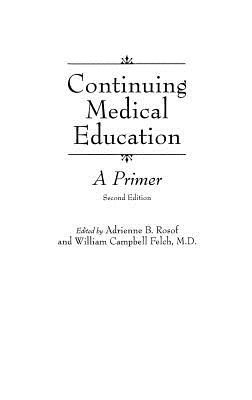

 Praeger
Praeger
Continuing Medical Education: A Primer


Key Metrics
- Adrienne Rosof
- Praeger
- Hardcover
- 9780275940102
- 9.26 X 6.18 X 0.73 inches
- 0.81 pounds
- Medical > Education & Training
- English
 Secure Transaction
Secure TransactionBook Description
The first edition of this book was intended to be a standard guide--a reference manual--that would be useful not only in the mechanics of producing a single program but also in organizing and operating a continuing medical education (CME) department on an ongoing basis. All over North America this primer has become a valuable aid to CME workers in the many locations--medical schools, professional associations, hospitals, specialty societies, industry--where the daily activities of CME are carried out. Outstanding features. It successfully combines clear explanations of some difficult concepts and theory in language that everyone will understand, practical examples, suggestions that come only from long years of experience, and brevity. Anyone interested in CME will want to own it. JAMA (Journal of the American Medical Association)
The first edition of this book was written with the aim of helping workers in the continuing medical education (CME) arena fulfill their responsibility to provide needed information to practicing physicians. Its purpose was to supply fundamental tools for CME providers to use in planning and carrying out their daily work. It was intended to be a standard guide--a reference manual--that would be useful not only in the mechanics of producing a single program but also in organizing and operating a CME department on an ongoing basis. There is anecdotal evidence from all over North America that this primer has become a valuable aid to CME workers in the many locations--medical schools, professional associations, hospitals, specialty societies, industry--where the daily activities of CME are carried out.
This second edition is divided into six parts. The first introduces the subject, looking at it in terms of its history, its current condition, and the major role played in its conduct by the voluntary accreditation system. The second discusses, with suitable theoretical underpinnings, the principles of adult education and how they apply practically to CME. The third and fourth parts turn to the operational aspects of CME, first in how to establish and manage a CME office in various locations, and then relating to such general subjects as marketing, planning meetings, using the medical library, using the general resources available, and the special relationship between CME and industry. The fifth section focuses on the individual learner, including the role of peer review in identifying learning needs, both for the average physician learner and the special physician learner whose competence is under question. The final part offers a glimpse down the road both in terms of CME (its ethical aspects) and the science of CME (the use of informatics technology), as well as its general prognosis.
Videos
No Videos
Community reviews
Write a ReviewNo Community reviews